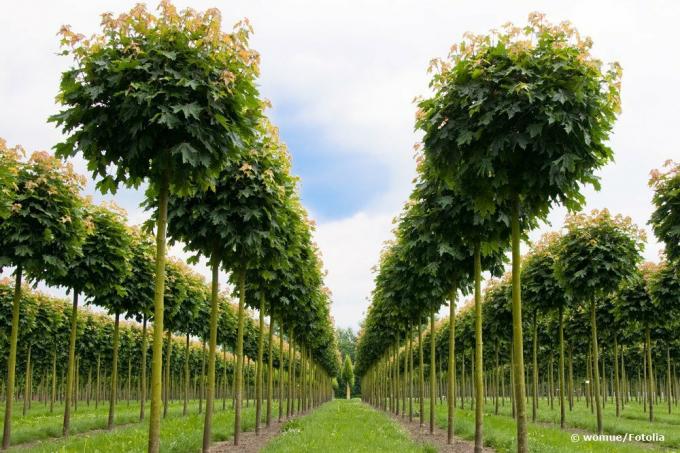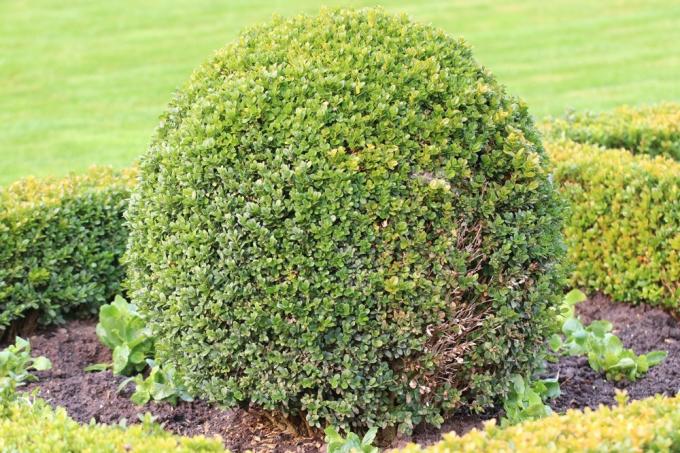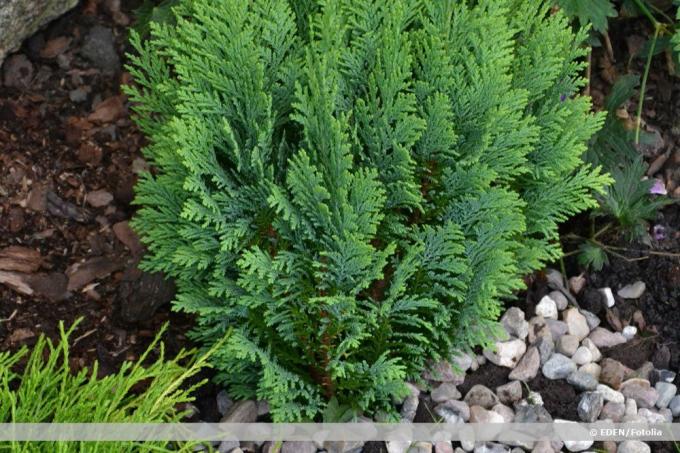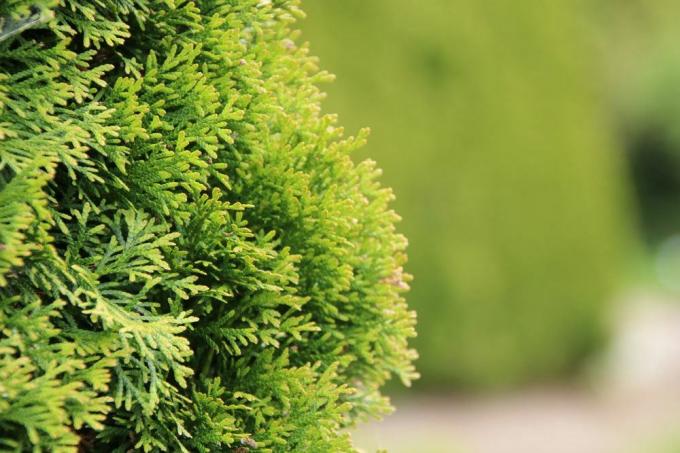
table of contents
- Spherical trees
- Boxwood
- Cherry laurel tree
- Ball ginkgo
- Spherical jaw "pug"
- Ball cork fir
- Black locust
- False cypress
- Dwarf tree of life
Evergreen spherical trees come in all sorts of variations: In addition to deciduous and woody plants, there are also large and small specimens. This makes it possible for every hobby gardener to plant evergreen spherical trees. We have put together an overview of the most popular specimens for you here!
Spherical trees
Evergreen plants decorate the home garden all year round. A wide variety of plants are available for this, with spherical trees being particularly popular. The crown of these trees is spherical and therefore extremely decorative. Many of these plants are also extremely easy to care for and frugal, which is why they are also ideal for beginners. It is also practical that there are both large and small copies. This means that every hobby gardener is sure to find the right ball tree for his garden.
Boxwood
Boxwood is one of the most popular spherical trees for the garden or terrace. This is not only an eye-catcher, but also extremely easy to care for. Since it only grows relatively slowly, it is ideal for locations with little space. It grows and thrives best in the shade or in the shade. Penumbra, but also tolerates different site conditions. The evergreen boxwood is considered to be robust, but it is sensitive to diseases, with various fungi in particular causing problems.
- botanical name: Buxus sempervirens
- Synonyms: common boxwood, boxwood
- Height: 200 - 400 cm
- Spread: 200 - 350 cm
- Location: shade or partial shade

Cherry laurel tree
The cherry laurel tree originally comes from Asia and is usually planted as a hedge in local regions. However, since it is very easy to cut, it can also be cultivated as a ball tree without any problems. In addition to regular pruning, the maintenance of the cherry laurel tree is relatively low. It is considered to be extremely easy to care for and makes little demands on location and soil. The evergreen cherry laurel tree also copes well with competition and can therefore usually be planted under other trees. In any case, it beautifies the garden all year round with its dark green, shiny foliage.
- botanical name: Prunus laurocerasus
- Synonyms: laurel cherry, common laurel cherry
- Growth height: up to 400 cm
- Location: sunny to partially shaded, sheltered from the wind
- Soil: tolerant of lime

Note: The seeds of the cherry laurel are for humans poisonous!
Ball ginkgo
The spherical ginkgo grows very slowly, making it the ideal candidate for limited locations. It prefers sunny to shady locations and a nutrient-rich soil, but is very adaptable. Under optimal conditions, the evergreen ginko adorns the home garden all year round with its exotic foliage. Especially in autumn it becomes an eye-catcher, because then its leaves turn bright yellow. The tree also produces fruits and flowers, but these are relatively inconspicuous compared to the foliage. The evergreen ginko is considered to be very robust and easy to care for, but should be additionally watered if it is prolonged drought.
- botanical name: Ginkgo biloba 'Mariken'
- Synonyms: ginko, ginkgo
- Height: 150 - 160 cm
- Spread: about 150 cm
- Location: sunny to shady
- Soil: nutrient-rich soil

Note: The ginkgo does not have to be cut into a spherical shape, because its crown naturally grows spherical. However, to maintain shape, it should be cut regularly over time.
Spherical jaw "pug"
Another candidate for small gardens is the pug pine, which reaches a maximum height of 105 cm. The shallow root grows well on normal garden soils and prefers a moderately dry to moist subsoil. The spherical dwarf shrub bears dark green needles and from June resp. July dark brown cones. It does particularly well in stone and heather gardens and can be planted both outdoors and in pots.
- botanical name: Pinus mugo
- Synonyms: pug jaw, spherical jaw
- Height: 50 - 150 cm
- Spread: 50 - 150 cm
- Location: sunny to partially shaded
- Soil: normal garden soil

Ball cork fir
Small spherical trees are ideal for small gardens, as is the spherical cork fir. This evergreen conifer grows about four to six centimeters per year and reaches a maximum height of about two meters. It grows particularly densely bushy and branched out. It also has decorative cones that are relatively small and brown in color. The spherical cork fir is extremely easy to care for and only needs little water.
- botanical name: Abies lasiocarpa
- Height: 100 - 200 cm
- Spread: 130 - 150 cm
- Location: sunny to partially shaded
- Soil: normal garden soil

Black locust
The black locust is a very vigorous plant, which is why a location with enough space is essential for it. Because both the size of the crown and the diameter of the trunk increase significantly with advancing age. It thrives best in sunny places with nutrient-rich, well-drained soil. However, it can also be cultivated on clay, sand or gravel soils. The maintenance effort is manageable: The large round robinia wants to be fertilized with compost in spring and cut regularly. Watering, however, is only necessary for freshly planted specimens. When properly cared for, the large black locust bears its feathery foliage all year round, which turns yellow, golden brown or red in autumn.
- botanical name: Robinia pseudoacacia "Umbraculifera"
- Growth height: up to 400 cm
- Spread: 400 - 500 cm
- Location: sunny and sheltered from the wind
- Soil: nutrient-rich, well-drained soil

Note: The wood is poisonous for both humans and animals! Particular caution is therefore required with children and pets.
False cypress
False cypresses are very often grown as a hedge, but they can also be cultivated as large spherical trees. For this, however, it must be cut regularly, especially since the false cypress grows 10 to 20 centimeters. There are even special templates to shape the cypress into a spherical shape. But not only the topiary is essential for the large false cypress, because regular pruning is also recommended. This can significantly slow down the balding from the inside. However, if the conifers are properly cared for, they will win you over with their dense and compact growth. The color of the foliage can vary depending on the variety, as there are blue, yellow and green false cypresses.
- botanical name: Chamaecyparis
- Height: up to 20 m
- Location: sunny, also copes with partial shade
- Soil: not too calcareous
- hardy: yes, protect young specimens from frost

Note: All parts of the plant of the false cypress are poisonous! Even repeated contact can have a toxic effect and irritate skin and mucous membranes.
Dwarf tree of life
If you only have little space available, you don't have to do without spherical trees! Because small trees like the evergreen dwarf tree of life do not need a lot of space. This is suitable for outdoor cultivation, but can also be planted in pots. The conifer originally comes from the Sichote-Alin Mountains in Eastern Siberia and is accordingly frost-hardy. The small tree does not have any soil requirements, because it copes well with both sandy and heavy soils. Only waterlogging is not good for the tree, which is why this should always be avoided.
- botanical name: Thuja occidentalis
- Synonyms: Siberian dwarf arborvitae, fan juniper
- Growth height: up to 100 cm
- Spread: up to 150 cm
- Location: sunny to partially shaded




